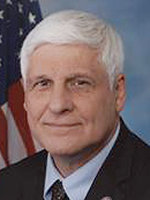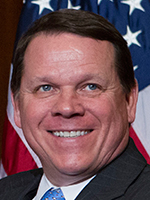Senior Reporter
CSA Reform Bill Introduced in US House

[Stay on top of transportation news: Get TTNews in your inbox.]
A new bill from the U.S. House proposes a pilot program to review potential benefits of remote carrier compliance reviews under the Compliance, Safety, Accountability program, as well as a national hiring standard for the trucking industry.
Under the CSA Reform Act, sponsored by Rep. Bob Gibbs (R-Ohio), remote compliance reviews would be conducted by the Federal Motor Carrier Safety Administration, state commercial motor vehicle authorities, or private contractors. CSA ratings assigned as part of the study, or pilot program, would not be publicly released.
The proposed national hiring standard would direct prospective contractors to verify, at least 45 days before a shipment, criteria about licenses and registrations, insurance, and CSA ratings.

Gibbs
“Truck drivers are a vital component of our nation’s logistics network,” Gibbs said Oct. 2. “Safe drivers ensure safe roads and the efficient delivery of goods, and the CSA program should work to enhance that safety at a regular, predictable schedule. The safety scores carriers rely on should be up to date and accurate. The CSA Reform Act will help shippers, brokers and intermediaries have access to that data.”
Gibbs’ legislation had been included in the Republican-sponsored STARTER Act, a comprehensive surface transportation measure opposed by Democrats on the House transportation committee.
“The STARTER Act is a common-sense transportation reauthorization and a stark contrast from the Democrats’ bill that prioritizes their far-left agenda rather than helping restore America’s infrastructure,” Railroads, Pipelines and Hazardous Materials Subcommittee ranking member Rep. Rick Crawford (R-Ark.) said recently.
Last month, the GOP leadership in the House unveiled a policy framework titled, “Commitment to America.” A five-year surface transportation plan included in the framework is meant to update myriad programs and facilitate the flow of commerce. The framework also takes aim at the environmental permitting process by proposing streamlining provisions.

Graves
“House Republicans understand the importance of a modern infrastructure to every state in America and our economy, which is why the ‘Commitment to America’ includes a five-year surface transportation reauthorization,” said Transportation and Infrastructure ranking member Sam Graves (R-Mo). “This critical long-term bill will be based on the STARTER Act, which committee Republicans introduced earlier this year once it became clear that a bipartisan surface transportation bill was not in Speaker [Nancy] Pelosi’s plans.”
“A five-year reauthorization of the surface transportation bill, combined with expedited permitting for major projects and other transportation reform measures, will create new and sustained jobs while laying the groundwork for the American economy to thrive,” added Highways and Transit ranking member Rodney Davis (R-Ill.).
Under the president’s fiscal 2021 budget request, the Operations and Programs account would receive a funding boost. The account pertains to consumer enforcement efforts, as well as the CSA program.

Chao
Graves and Davis also led the Republicans’ reaction to the U.S. Department of Transportation’s emphasis on rural freight corridors. Secretary Elaine Chao indicated the program is meant to assist rural communities with navigating and accessing federal grants.
The secretary explained that the network of freight and commuter corridors across rural areas are garnering newfound attention under the Trump administration. As she put it during a hearing with senators in March, “After a period of great neglect, we are finally beginning to address the needs of rural America.”
RELATED: DOT Unveils Applicant Toolkit for Rural Communities
The Rural Opportunities to Use Transportation for Economic Success program, or ROUTES, was announced last year. The initiative is carried out via input from DOT agencies, such as the Federal Highway Administration, the Federal Transit Administration, the Federal Railroad Administration and the Federal Aviation Administration.
Want more news? Listen to today's daily briefing:
Subscribe: Apple Podcasts | Spotify | Amazon Alexa | Google Assistant | More

